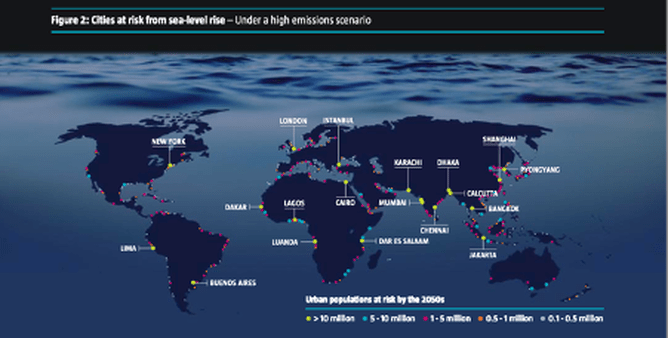Sustainable Investing - Climate Change - cities at risk from seal level rise.
Climate change threatens 1.1 meter sea level rise before 2100 unless climate change is tackled.
Analysis by the International Panel on Climate Change (IPCC) makes the prediction in its ‘Special Report on the Ocean and Cryosphere in a Changing Climate’, which studies the effect of global warming on sea levels.
It says 90% of the 1 degree Celsius rise in average global temperatures above pre-industrial levels seen thus far has been absorbed by the oceans, having a major impact on sea life and corals. The Paris Agreement signed in 2015 aims to restrict global warming to 1.5 degrees Celsius by the end of this century.
However, record levels of carbon emissions that show no signs of abating have accelerated global warming. The IPCC report now warns that unless drastic action is taken for the world to become carbon neutral by 2050, global warming may become uncontrollable.
Why is this important?
Global warming is causing the ice caps to melt, with record levels of glacier melting seen in the Arctic and Antarctic, disgorging billions of tons of fresh water into the ocean. The problem is made worse because frozen areas such as permafrost trap carbon that is released when it melts, causing a vicious cycle of further warming.
The IPCC report says that global average sea levels could now rise by up to 1.1m by 2100,up 10 cm on previous estimates. Rising sea levels threatens dozens of large coastal cities and those that lie on tidal rivers, including London, New York, Mumbai, Shanghai and Jakarta. It also risks flooding countries that lie below or at sea level, such as Bangladesh, the Netherlands and most islands in the Pacific and Indian oceans.
What does this mean for investors?
Investing in Renewable Energy, Sustainable Energy alternatives and companies that help combat global warning. Being aware of the carbon footprint of the investments held within the investment portfolio (where possible).
One way that investors can help the fight against global warming is by investing in the UN’s Sustainable Development Goals, particularly SDG 13 on Climate Action.
What are we doing about this at Moneyworks?
We have built a proprietary system that enables us to understand exactly where the investments that we recommend are invested (based on twice yearly declarations). We then understand the pro's and con's of these investments if they fall into the 'nasties' categories.
We are building portfolios for our clients that are fully ethical (where the investments are designed to do good for the world) and 'hybrid' (where there is strong ESG and ethical integration into the investment selection).
We analyse the investments that we recommend to make sure that they are 'true to label' and aren't greenwashing (Greenwashing is a marketing ploy companies use to make their products sound more environmentally friendly than they are. Their claims are often exaggerated, misleading and not backed up by evidence) or brownwashing - (To rebrand, cover up or divert attention from amoral, illicit or criminal activities by establishing partnerships or connections with legitimate, value-based organizations e.g. NGOs).
We are continually reviewing and tracking our recommended fund managers to make sure that their investment performance provides good returns for you and that they are 'walking the talk'.
If you want to find out more about our ethical investing approach, contact us by clicking here.


